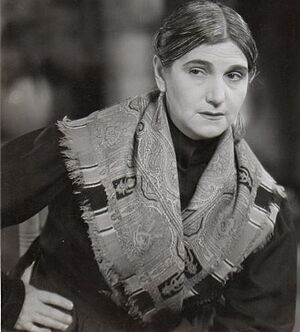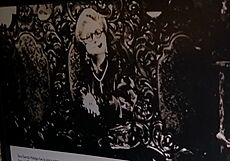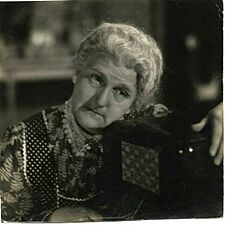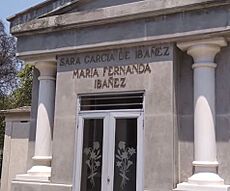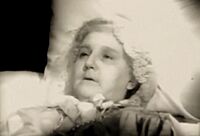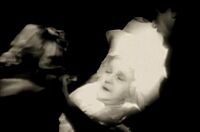Sara García facts for kids
Sara García Hidalgo (born September 8, 1895 – died November 21, 1980) was a famous actress from Mexico. She became very well-known during the "Golden Age of Mexican cinema". This was a time when Mexican movies were very popular.
During the 1940s and 1950s, Sara García often played the role of a strong but kind grandmother in many Mexican films. Later in her career, she also acted in Mexican TV shows called telenovelas. People in Mexico remember her by her special nickname, La Abuelita de México, which means "Mexico's Grandmother".
Contents
Early Life and Career Beginnings
Growing Up in Mexico (1895–1917)

Sara García Hidalgo was born on September 8, 1895, in Orizaba, Veracruz, Mexico. Her parents, Isidoro García Ruiz and Felipa Hidalgo de Ruiz, were from Andalusia, Spain. They had moved to Veracruz from Havana, Cuba. Sara was the only one of their eleven children who survived.
In 1900, a big storm caused the Santa Catarina river to flood. The bridge that Sara used to cross to school was destroyed. Her father, Isidoro, thought he had lost his daughter. This worry made him very sick. Sara's mother, Felipa, sold her business and moved the family to Mexico City. Sadly, Sara's father passed away soon after they arrived.
When Sara was 9, she went to a special school called Las Vizcaínas. In 1905, a sickness called typhus spread in Mexico. Sara got sick, and then her mother, Felipa, also got sick and died. Sara stayed at the school under the care of the director, Cecilia Mallet. Sara was a good student and behaved well, which allowed her to stay. The director saw that Sara loved art and encouraged her to paint. Sara also became a teacher and had her students perform plays.
Starting Her Acting Journey (1917)
Sara began her acting career at age 22 while she was still a teacher. One day, she visited the new Azteca Films studios. She was fascinated by everything she saw. She started to think about acting, even if it was just in the theater.
An actor from Azteca Films noticed her interest. He invited her to be in her first movie, En defensa Propia ("In Self-Defense"), in 1917. After this, she started trying out for roles in the theater. Her clear speaking and strong voice helped her become part of important theater groups of that time.
The Golden Age of Mexican Cinema
Becoming "Mexico's Grandmother" (1918–1947)
In 1918, Sara married Fernando Ibáñez. They traveled around Mexico and Central America for their theater work. In Tepic, Sara gave birth to their daughter, Fernanda Mercedes. Sara decided to stop touring to take care of her daughter. This made Fernando unhappy, and he started other relationships. Sara divorced him and left with Fernanda. Years later, Fernando became ill, and Sara took care of him until he died in 1932.
Sara became very successful in theater and soon started getting roles in movies. Her daughter, Fernanda, also acted in a movie called "La madrina del diablo" (1937). In this film, she played the girlfriend of actor Jorge Negrete. Jorge Negrete tried to date Fernanda, but Sara did not approve. The romance ended, and Fernanda married an engineer in 1938. She moved away, but sadly, she died from typhoid fever in 1940. Sara was very strong and continued her career for 40 more years after her daughter's death.
Sara García was very dedicated to her acting. When she was 40, she decided to have her teeth removed. She did this so her mouth would look like an older woman's. She wanted to play roles as caring older ladies more realistically.
Actress Emma Roldán suggested Sara García for the role of Doña Panchita, an old woman, in the 1940 film Allá en el trópico ("There in the Tropics"). The director, Fernando de Fuentes, thought Sara was too young. But Emma Roldán said, "Sara is an actress, and actresses don't have an age." For her screen test, Sara wore a special wig. When the director saw her, he was amazed. Her wig, her missing teeth, and her acting made her look exactly like an old woman. In this film, Allá en el trópico, Sara García earned her famous nickname, la Abuelita de México (Mexico's Grandmother).
In 1942, Sara García acted with Joaquín Pardavé in El baisano Jalil. This was a comedy about a Lebanese immigrant family in Mexico City. She also starred with Pardavé in a similar comedy, El barchante Neguib (1945).
She then appeared in many films with other big stars of Mexican cinema, like Cantinflas, Jorge Negrete, and Germán Valdés "Tin-Tan". She often played the grandmother of the famous Mexican actor Pedro Infante. One of her most famous films with him was Los tres García (1947). In this movie, she played a strong, funny, and bossy grandmother to Pedro Infante and other actors.
Later Films and TV Shows (1947–1980)
Sara García continued to work with Joaquín Pardavé in films like "El ropavejero" (1947) and "Azahares para tu boda" (1950). She also showed her funny side in movies like Doña Clarines (1951), where she made fun of her own grandmother character. She did this again in Las señoritas Vivanco (1959) and El proceso de las señoritas Vivanco (1961).
In the 1960s, she worked in both movies and television. She appeared in many telenovelas, such as "A Face in the Past" (1960) and "La Duquesa" (1966). In "La Duquesa," she played a lottery ticket seller who wins a lot of money. She uses the money to get her daughter back, who she had given up to rich relatives.
In the 1970s, her grandmother character appeared in films like "Fin de fiesta" (1972) and "Mecánica Nacional" (1972). Even when her characters used strong language, it was still charming because it came from "Mexico's Grandmother." She also played Nana Tomasita in the long-running telenovela Mundo de juguete (1974).
Personal Life
During her time at Las Vizcaínas school, Sara met Rosario González Cuenca. Years later, after Sara divorced Fernando Ibáñez, they met again. Rosario was also divorced, and they started living together. Rosario acted as an aunt to Sara's daughter, Fernanda. Sara lived the rest of her life with Rosario.
Sara really liked Pedro Infante, one of her co-stars. However, she did not like Jorge Negrete because he had been interested in her daughter, Fernanda. Many friends said Sara was a very strict mother-in-law and did not approve of Jorge and Fernanda's relationship.
Later Years and Passing
Sara García had her own TV show in 1951 called Media hora con Abuelita, but it was canceled. She returned to television in 1960 with a role in Un rostro en el pasado. This was the first of eight telenovelas she acted in. These included Mundo de juguete in 1974, which was one of the longest-running telenovelas ever. She also appeared in Viviana with Lucía Méndez in 1978.
On November 21, 1980, Sara García passed away in Mexico City at the age of 85. She had a cardiac arrest (heart attack) caused by pneumonia. A few days before, she had been in the hospital after falling down the stairs at her home.
Sara García was buried next to her daughter in a special tomb at the Panteón Español cemetery in Mexico City. During her burial, the song "Mi Cariñito" ("My Little Darling") was played. This was a song that Pedro Infante often sang to Sara in movies. It is said that the singer Lucha Villa sang it at Sara's funeral.
Legacy
Sara García became a symbol of a grandmother in Mexico because of her many roles as a grandma in movies. In 1973, she allowed the chocolate company La Azteca to use her image on their traditional Abuelita chocolate product. Later, in 1995, the Nestlé company bought La Azteca. Nestlé continues to use Sara García's image on the same chocolate brand today.
Filmography
Telenovelas
| Year | Title | Role | Notes |
|---|---|---|---|
| 1960 | Un rostro en el pasado | 3 episodes | |
| 1962 | La gloria quedó atrás | 3 episodes | |
| 1966 | La duquesa | La duquesa (Duchess), Raquel | 3 episodes |
| 1967 | Anita de Montemar | 3 episodes | |
| 1968 | El padre Guernica | ||
| 1968 | Mi maestro | ||
| 1972 | Telenovela mensual | ||
| 1973 | Mi rival | Chayo | 19 episodes |
| 1974-1977 | Mundo de juguete | Nana (Nanny) Tomasita | 221 episodes |
| 1978 | Viviana | Doña Angustias Rubio Montesinos | 3 episodes |
Television Shows
| Year | Title | Role | Notes |
|---|---|---|---|
| 1951 | Media hora con la abuelita | ||
| 1957, 1959 | Secreto de familia | 4 episodes |
Documentaries
| Year | Title | Role | Notes |
|---|---|---|---|
| 1940 | Recordar es vivir | ||
| 1963 | La vida de Pedro Infante | ||
| 1976 | México de mis amores |
Mexican Cinema Films
| Year | Title | Role | Notes |
|---|---|---|---|
| 1917 | En defensa Propia | Extra | |
| 1917 | Alma de sacrificio | Extra | |
| 1917 | La soñadora | Extra | |
| 1927 | Yo soy tu padre | Extra | |
| 1934 | El pulpo humano | ||
| 1934 | El vuelo de la muerte | Doña Clara | |
| 1934 | La sangre manda | Vecina (Neighbor) | |
| 1934 | ¡Viva México! (El grito de Dolores) | Josefa Ortiz de Domínguez | |
| 1936 | Such Is Woman (Así es la mujer) | Viuda (Widow) | |
| 1936 | Malditas sean las mujeres | Señora de Ambrosaliet | |
| 1936 | No te engañes corazón | Doña Petro | |
| 1937 | Las mujeres mandan | Marta | |
| 1937 | La honradez es un estorbo | Doña Refugio | |
| 1937 | No basta ser madre | Sebastiana del Puerto | |
| 1938 | Por mis pistolas | ||
| 1938 | Pescadores de perlas | Juana | |
| 1938 | Dos cadetes | Dolores | |
| 1938 | Padre de más de cuatro | Doña Gertrudis | |
| 1938 | Perjura | Doña Rosa | |
| 1938 | Su adorable majadero | Mariquita | |
| 1939 | El capitán aventurero | Catalina, corregidora | |
| 1939 | Los enredos de papá | Petra | |
| 1939 | Calumnia | Eduviges | |
| 1939 | Papacito lindo | Remedios | |
| 1939 | En un burro tres baturros | Manuela | |
| 1940 | Miente y serás feliz | Constancia | |
| 1940 | Allá en el trópico | Doña Panchita | |
| 1940 | Mi madrecita | Madre | |
| 1940 | Here's the Point' | Clotilde Regalado, Leonardo del Paso's mistress | |
| 1940 | Father Gets Untangled (Papá se desenreda) | Petra | |
| 1940 | Father Gets Entangled Again (Papá se enreda otra vez) | Petra | |
| 1941 | Cuando los hijos se van | Lupe de Rosales | |
| 1941 | ¿Quién te quiere a ti? | ||
| 1941 | La gallina clueca | Teresa de Treviño | |
| 1941 | Al son de la marimba | Doña Cornelia Escobar | |
| 1942 | Las tres viudas de papá | Petra | |
| 1942 | Dos mexicanos en Sevilla | Gracia | |
| 1942 | Regalo de Reyes | Doña Esperanza | |
| 1942 | La abuelita | Doña Carmen | |
| 1942 | Historia de un gran amor | Doña Josefa | |
| 1942 | El baisano Jalil | Suad | |
| 1942 | El verdugo de Sevilla | Doña Nieves | |
| 1943 | Resurrection (Resurrección) | Genoveva | |
| 1943 | No matarás | Aurora | |
| 1943 | Caminito alegre | Antonia Goyena | |
| 1943 | Toros, amor y gloria | Irene | |
| 1944 | Mis hijos | María | |
| 1944 | La trepadora | Doña Carmelita | |
| 1944 | El secreto de la solterona | Marta | |
| 1944 | El jagüey de las ruinas | Doña Teresa "Mamanina" | |
| 1944 | Como yo te quería | Remedios Mantilla | |
| 1945 | Escuadrón 201 | Doña Herlinda | |
| 1945 | La señora de enfrente | Lastenia Cortazano | |
| 1945 | Mamá Inés | Inés Valenzuela | |
| 1946 | El barchante Neguib | Sara | |
| 1946 | ¡Ay qué rechula es Puebla! | Doña Severa | |
| 1947 | Sucedió en Jalisco (Los cristeros) | Doña Engracia, abuela (Grandma) | |
| 1947 | El ropavejero | María | |
| 1947 | Los tres García | Doña Luisa García viuda de García | |
| 1947 | Vuelven los García | Doña Luisa García viuda de García | |
| 1948 | Los que volvieron | Marta Ortos | |
| 1948 | Mi madre adorada | Doña Lolita | |
| 1948 | Dueña y señora | Toña | |
| 1948 | Tía Candela | Candelaria López y Polvorilla "Tía Candela" | |
| 1949 | Dicen que soy mujeriego | Doña Rosa | |
| 1949 | The Perez Family (La familia Pérez) | Natalia Vivanco de Pérez | |
| 1949 | Eterna agonía | Doña Cholita | |
| 1949 | Novia a la medida | Doña Socorro | |
| 1949 | El diablo no es tan diablo | Doña Leonor | |
| 1949 | Dos pesos dejada | Prudencia | |
| 1950 | Yo quiero ser hombre | Tía Milagros / Doña Tanasia | |
| 1950 | Mi preferida | Doña Sara | |
| 1950 | Si me viera don Porfirio | Doña Martirio | |
| 1950 | Azahares para tu boda | Eloísa | |
| 1950 | Mi querido capitán | Pelancha | |
| 1950 | Yo quiero ser tonta | Atilana | |
| 1951 | La reina del mambo | Tía (Aunt) | |
| 1951 | El papelerito | Doña Dominga | |
| 1951 | Doña Clarines | Clara Urrutia 'Doña Clarines' | |
| 1951 | La duquesa del Tepetate | Chonita, Duquesa del Tepetate | |
| 1951 | Acá las tortas | Dolores | |
| 1952 | La miel se fue de la luna | Doña Martirio | |
| 1953 | Misericordia | Benigna | |
| 1953 | Por el mismo camino | Tía Justa | |
| 1953 | El lunar de la familia | Doña Luisa Jiménez | |
| 1953 | Genio y figura | Doña Luisa | |
| 1953 | Los que no deben nacer | Clotilde | |
| 1954 | Los Fernández de Peralvillo | Doña Conchita Fernández; doña Chita | |
| 1954 | El hombre inquieto | Doña Fátima Sayeh | |
| 1955 | Sólo para maridos | Concordia | |
| 1956 | El crucifijo de piedra | Laura | |
| 1956 | La tercera palabra | Matilde | |
| 1956 | El inocente | Madre de Mané | |
| 1957 | La ciudad de los niños | Doña Juliana | |
| 1957 | Pobres millonarios | Doña Margarita del Valle | |
| 1958 | El gran premio | Soledad Fuentes Lago (Doña Cholita) | |
| 1958 | Con el dedo en el gatillo | La abuela | Episode: El anónimo |
| 1959 | Los Santos Reyes | La anciana | |
| 1959 | Las señoritas Vivanco | Hortensia Vivanco y de la Vega | |
| 1959 | Yo pecador | Nana Pachita | |
| 1961 | El proceso de las señoritas Vivanco | Doña Hortensia Vivanco y de la Vega (as Doña Sara Garcia) | |
| 1961 | ¡Mis abuelitas... nomás! | Doña Casilda | |
| 1961 | El buena suerte | Doña Paz | |
| 1961 | Paloma brava | Doña Popotita | |
| 1961 | El analfabeto | Doña Epifanita | |
| 1962 | El malvado Carabel | Tía Elodia | |
| 1962 | Las hijas del Amapolo | La abuela | |
| 1962 | El caballo blanco | Doña Refugio | |
| 1962 | Ruletero a toda marcha | Doña Sarita | |
| 1964 | Las Chivas Rayadas | Doña Pancha | |
| 1964 | Los fenómenos del futbol | Doña Pancha | |
| 1964 | Nos dicen las intocables | Doña Cucaracha | |
| 1964 | Héroe a la fuerza | Doña Prudencia | |
| 1965 | Canta mi corazón | Abuela | |
| 1965 | Escuela para solteras | Doña Bernarda | |
| 1965 | Nos lleva la tristeza | Doña Marina Guerra viuda de Batalla | |
| 1966 | Los dos apóstoles | Doña Angustias | |
| 1966 | Joselito vagabundo | Doña Guadalupe | |
| 1967 | Seis días para morir | Doña Mercedes | |
| 1967 | Un novio para dos hermanas | Seňora Cáceres | |
| 1967 | Las amiguitas de los ricos | Viejecita | |
| 1968 | Sor Ye Ye | Madre María de los Ángeles | Co-produced with Spain |
| 1969 | No se mande, profe | Doña Claudia | |
| 1969 | Flor marchita | Paula la nana | |
| 1969 | El día de las madres | Doña Carmen | |
| 1970 | ¿Por qué nací mujer? | Doña Rosario | |
| 1971 | La casa del farol rojo | Doña Sara Morales viuda de Mendoza | |
| 1970 | La hermana dinamita | Madre Ana | |
| 1972 | La inocente | La abuela | |
| 1972 | Fin de fiesta | Doña Beatriz | |
| 1972 | Nadie te querrá como yo | Abuela | |
| 1972 | National Mechanics (Mecánica nacional) | Doña Lolita | |
| 1973 | Entre Monjas Anda el Diablo | Sor Lucero | |
| 1973 | Nosotros los feos | Doña Sara García viuda de García y García | |
| 1973 | Valente Quintero | Elvira Peña | |
| 1974 | Los Leones del ring | Doña Refugio | |
| 1974 | Los Leones del ring contra la Cosa Nostra | Doña Refugio | |
| 1974 | Fé, Esperanza y Caridad | Anciana | Segment: Caridad |
| 1974 | El hijo del pueblo | Vicenta Aurelia Fernandez; Chenta | |
| 1977 | Como gallos de pelea | Doña Altagracia | |
| 1977 | Nobleza ranchera | Altagracia | |
| 1978 | La comadrita | Doña Chonita | |
| 1979 | La vida difícil de una mujer fácil | Doña Amalia | |
| 1979 | Como México no hay dos | ||
| 1980 | Sexo vs. sexo | Señora dueña del club de Can-Can (Lady Owner of Can-Can Club) |
United States Cinema Films
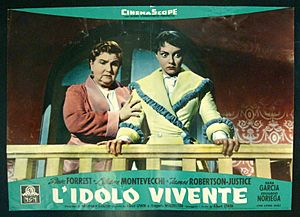
| Year | Title | Role | Notes |
|---|---|---|---|
| 1957 | The Living Idol (El ídolo viviente) | Elena | Co-produced with Mexico |
Italian Cinema Films
| Year | Title | Role | Notes |
|---|---|---|---|
| 1964 | Los dinamiteros (L'ultimo rififi) | Doña Pura | Co-produced with Spain |
Spanish Cinema Films
| Year | Title | Role | Notes |
|---|---|---|---|
| 1961 | Lovely Memory | Dona Sara |
See also
 In Spanish: Sara García para niños
In Spanish: Sara García para niños
 | Percy Lavon Julian |
 | Katherine Johnson |
 | George Washington Carver |
 | Annie Easley |


